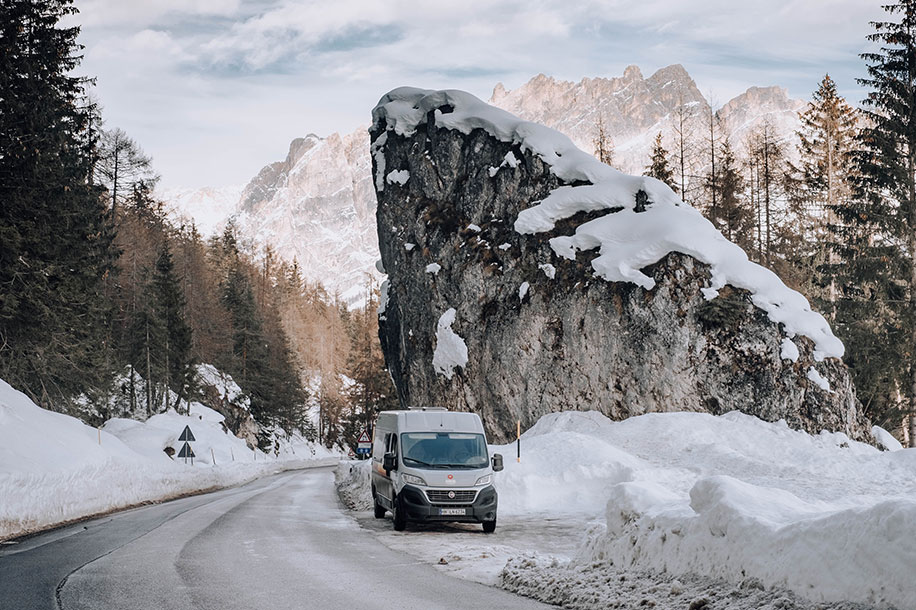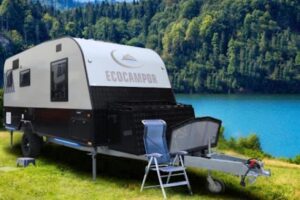Defining “Without Electricity”
There are actually relatively few options for producing heat in a camper that truly require no electricity. I will discuss those options further along in the article, so stick around.
For the purposes of this article, when I talk about heating a camper “without electricity”, I’m referring to heating a camper without being connected to shore power. Shore power is an unlimited source of AC power being provided to your camper via an external source.
Types of Power in Your Camper
What’s AC power then? Most campers are going to have two electrical systems: AC and DC. Below are some simple explanations as to the differences between AC and DC power in relation to your RV.
Alternating Current
AC, or alternating current power is used to power the 110-volt or 120-volt system in your camper. 120-volt (120V) power is for powering large appliances in a camper, such as microwaves and air conditioners.
The wall plugs in your camper will also be on the 120V system.
Direct Current
DC or direct current power is used to power the 12V system in your camper. 12V is used to power small appliances such as lights and fans.
It is also the type of power supplied when a phone charger or small appliance is plugged into the cigarette lighter of your vehicle.
Check Your Insulation
Before worrying about how to heat a camper without electricity, it’s important to consider insulation.
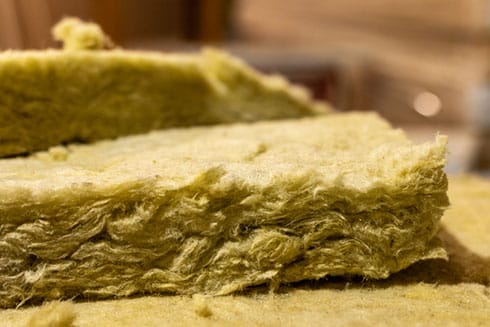
Without proper insulation all efforts to heat a camper will be in vain. You’ll just be pouring time and money into heating a space that isn’t holding onto that warm air.
Do these insulation improvement projects in order to ensure you are as efficient with your heat as possible:
- Seal your camper: Using caulk or weather stripping, seal any open hole in your RV that is allowing cold air to leak in.
- Install a skirt: An RV skirt will insulate the undercarriage of your camper and prevent wind and cold air from leeching warmth through the floor.
- Upgrade the insulation: It might be time to revamp the insulation situation in your RV. If you have the time and budget, installing more efficient insulation in your floor, ceiling, and walls will have a dramatic impact on your heat situation.
I’ve written about how to insulate a camper trailer in the past. Check it out if you want a more in-depth explanation of how to up your insulation game.
How to Heat a Camper Without Electricity
Try the methods outlined below to keep your camper toasty all winter long without paying a premium for power.
Use Your Camper’s Stock Furnace
Most motorhomes, RVs, and many types of camper trailers come stock with a furnace that uses propane gas for producing heat, and 12V power to regulate and monitor temperature.
A propane furnace can do a very efficient job keeping your camper warm on all but the coldest of winter nights.
Consider where you will be doing most of winter camping. If you’ll be in moderate climates and temperatures will never dip too low below freezing, your stock RV propane furnace could be fully sufficient for keeping your rig toasty on winter nights.
Portable Space Heaters
For some, even the low energy draw from using their camper’s stock furnace is more power than they are willing to sacrifice to stay warm at night.
If you find yourself in that camp, you might be asking, are there heaters that don’t require electricity? Like zero electricity?
Yes. A portable space heater like this very popular Mr. Heater is a fantastic option for those of you who want to be cozy warm at night and not worry about draining your batteries as you sleep.
I have stayed in a truck bed camper like this Rear folding Camper while on ski trips and used a portable space heater to stay warm all weekend.
Caution: Potential Moisture
Be aware of moisture buildup if you opt to use a propane powered space heater in your camper. Portable propane heaters produce wet heat, meaning the heat they produce also creates moisture.
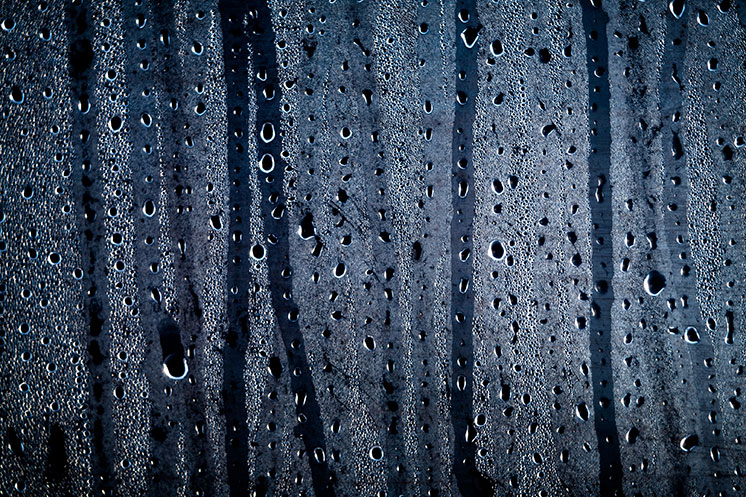
Over time this moisture will build-up and condense, potentially leading to the growth of molds and mildews. If you do go this route, consider buying a dehumidifier for your camper to control humidity levels
Are Portable Space Heaters Safe?
Portable space heaters have vastly improved in quality and efficiency in the past thirty years and for the most part can be considered safer than ever. With that said, using a propane heater in enclosed spaces is not without risks:
- Never use propane heaters inside your camper without proper ventilation. Air flow is critical in preventing the buildup of dangerous gas that can be produced from burning propane.
- Use care to not leave flammable items such as clothing, tissues, or towels near the source of heat as you sleep. It’s always a good idea to have a fire extinguisher handy just in case.
I advise all of my clients, friends, and family to purchase a carbon monoxide alarm for their camper. These will monitor if CO2 is concentrating in your camper and alarm if gas levels approach dangerous levels.
If for whatever reason you do not want to use a portable propane heater, there are also portable space heaters that run on diesel fuel.
Diesel Air Heaters
Different from a diesel-powered portable heater, a diesel air heater is a secondary furnace unit that can be installed in your camper and runs off the diesel fuel housed in your camper’s fuel tank. These units can be installed somewhere in the main cabin of the camper, or in the undercarriage.
If you are asking yourself, “What is the cheapest way to heat an RV?”, this is it. For this reason, diesel air heaters have been used for decades in the trucking industry and are a fantastic option for a primary or secondary heating source in your rig.
Similar to your camper’s stock furnace, a diesel heater isn’t going to be able to function without any electricity.
Most units run off a DC power supply meaning they can be run for hours at a time without your camper being hooked up to shore power. This power draw is relatively low and is used to regulate temperature, allow communication between the furnace and the remote, and power LEDs in the furnace display.
If you plan on having a diesel heater installed in your camper, make sure it is installed by a technician that is certified to install that specific brand of heater. These units tap into your camper’s diesel fuel tank and are capable of producing a lot of heat.
If the installation is done improperly, you put yourself and your camper at risk of injury or damage. By having a certified technician install your furnace, you will likely get a warranty on the work, and you can rest easy knowing the job was done right.
How Can I Heat My RV Without Propane or Electricity?
This is the big question. Many of you are probably looking for a heating solution that is as off-the-grid as possible. No power needs, no runs to town to refill propane tanks. Just you and the great outdoors, unbothered and care-free.
Unfortunately, there are very limited options in this regard, but you’re not completely out of luck.
Wood Stoves
Needing only scrap wood and paper, wood stoves are going to be your best option for heating your rig without propane or electricity.
When hearing the words “wood stove” in regard to a camper, many RVers tense up in fear and discomfort. To many, it’s not easy to grasp the concept of intentionally starting a fire inside your camper.
I’m of the opinion that if properly installed and operated, a wood stove is no more dangerous in an RV than it is in a house or cabin. Of course, there are natural risks involved any time you light a fire, but with caution and diligence a wood stove can safely produce more than enough heat for a camper.
Types of Wood Stoves
Full Size
If you are converting a school bus or have a large RV, then you may be able to get away with picking up a cheap, old full-size wood stove and installing it in your rig.
These beasts will produce massive amounts of heat, consume full sized logs, and can even be used as an additional cooking surface.

Mini Wood Stoves
If you have a smaller camper or a van, you’ll want to invest in a newer mini wood stove that is specifically made for campers.
I remember a buddy of mine buying a small stainless steel wood stove for his van several years back. He was absolutely hyped when it was installed and in use. With only a handful of wood scraps he could heat his van in the evening and that heat would last him through the night.
Sounds great, right? Cheap and relatively easy heat all night long.
This buddy of mine is the perfect type of person for owning one of these units. He has unlimited energy and fascination for the types of chores needed to maintain a functional wood stove in a camper.
If you feel as though you’re not up for the daily tasks necessary to utilize a wood stove (collecting/chopping wood, emptying ash, stoking the fire), then this option might not be for you.
Install Your Wood Stove with Care
In order to install wood burning stoves in a camper, it is necessary to cut a hole in your wall or ceiling to run the chimney through. The chimney pipe will also need a special heat-resistant insulating wrap where it passes through the exterior of the rig.
Because of these specialized installation requirements and the inherent risks that come with fire, I advise having a professional do your wood stove installation.
Other Ways to Stay Warm This Winter
So, now you know how to heat a camper without electricity, but what do you do when the mercury dips way low?
There are many alternative ways to keep yourself warm while adventuring in your camper. Try these seven techniques for an extra boost of warmth in cold climates:
- Hot water bottles: Cheap and easy to use, a hot water bottle is a rubber pouch that can be filled with hot or warm water and placed in your bed as an additional pocket of warmth. These are especially useful if you have poor circulation and struggle to keep your toes warm as you sleep.
- Down blankets: Comforters filled with bird down are some of the warmest blankets available. Spend the extra money and pick one up, you’ll be glad you invested in a truly warm blanket.
- Zero-degree sleeping bags: Some people will always prefer a sleeping bag over a blanket for camping. If that’s you, investing in a zero-degree sleeping bag will keep you warm down to, well, zero degrees Fahrenheit.
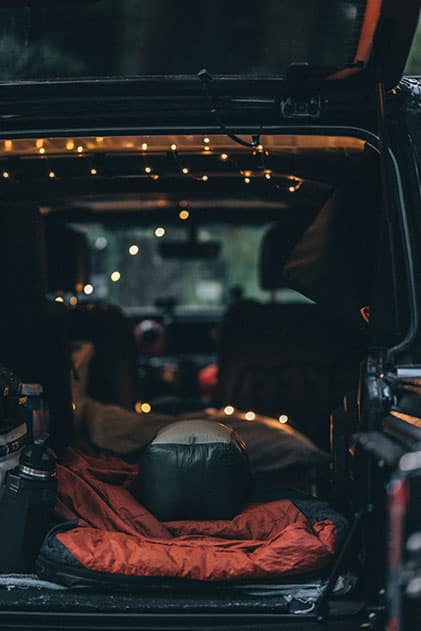
- Electric heaters: This is not an electricity-free option for staying warm. An electric heater will use your 120V AC power system and therefore draw a lot of power. They are great to have on hand though if you find yourself in cold climates and connected to shore power.
- Warm socks: I always change into a clean, dry pair of merino wool socks before bed when I am camping. This simple step makes a huge difference in how warm my feet stay as I doze off.
- Hot Rocks: Similar in use to a hot water bottle, rocks can be heated by a campfire, wrapped in a towel, and placed in your bed to preheat it before you crawl in. Rocks will retain heat longer than water and keep you warm later into the night. If you try this technique, use smooth, dry rocks, and stand back as you heat them. Rocks have been known to crack or explode when exposed to high heat. Please be careful.
- Electric blankets/sheets: Another high power-draw option, electric blankets and sheets are only really a viable option if you have a connection to shore power.
Adventure Time!
Now that you know how to heat a camper without electricity, you’ll be able to pursue cold-climate camping with confidence and ease. Chase those mountains and endless horizons, the world is yours.

